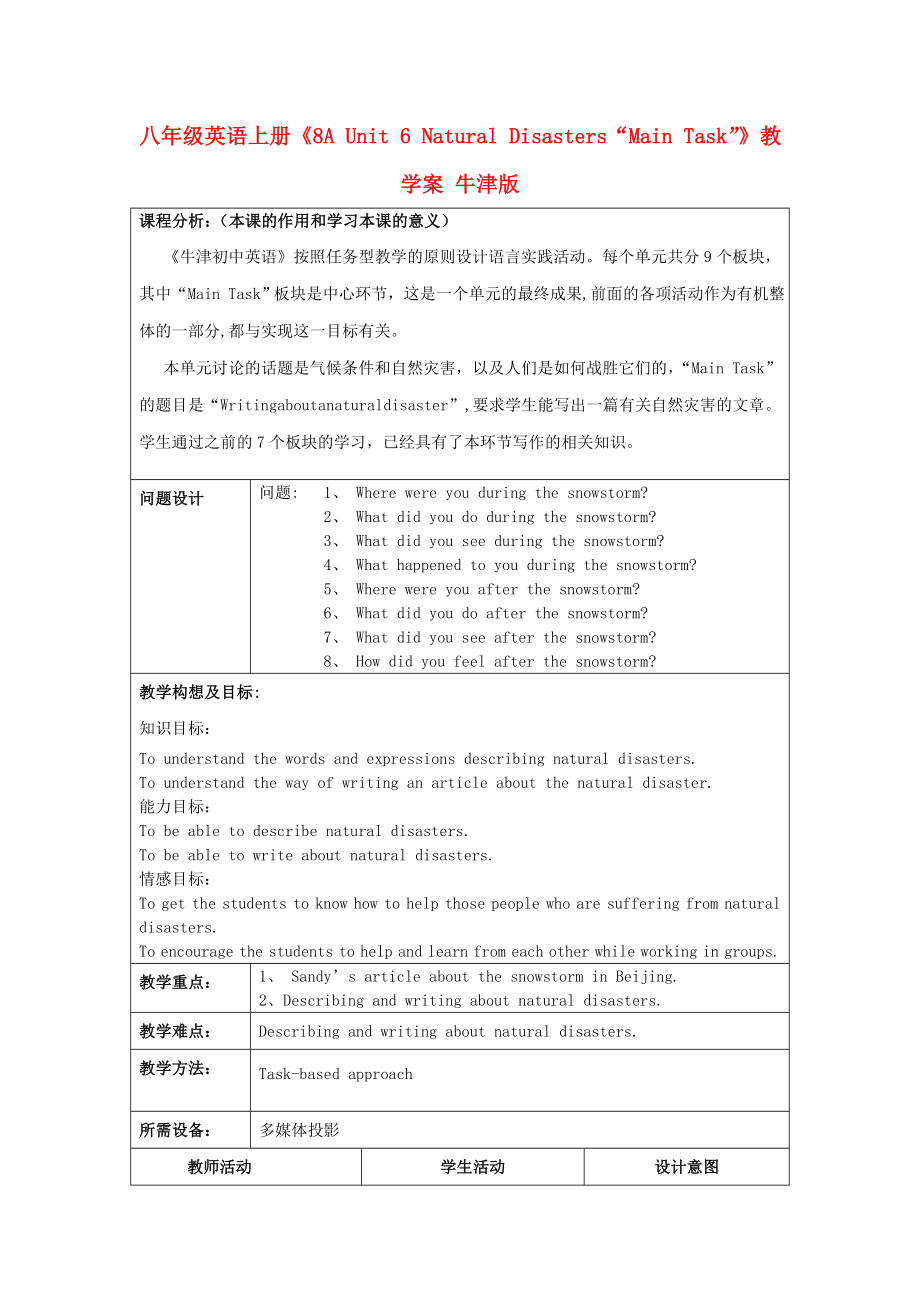《八年級(jí)英語(yǔ)上冊(cè)《8A Unit 6 Natural Disasters“Main Task”》教學(xué)案 牛津版》由會(huì)員分享���,可在線閱讀,更多相關(guān)《八年級(jí)英語(yǔ)上冊(cè)《8A Unit 6 Natural Disasters“Main Task”》教學(xué)案 牛津版(3頁(yè)珍藏版)》請(qǐng)?jiān)谘b配圖網(wǎng)上搜索����。
1、八年級(jí)英語(yǔ)上冊(cè)《8A Unit 6 Natural Disasters“Main Task”》教學(xué)案 牛津版
課程分析:(本課的作用和學(xué)習(xí)本課的意義)
《牛津初中英語(yǔ)》按照任務(wù)型教學(xué)的原則設(shè)計(jì)語(yǔ)言實(shí)踐活動(dòng)�����。每個(gè)單元共分9個(gè)板塊��,其中“Main Task”板塊是中心環(huán)節(jié)�,這是一個(gè)單元的最終成果,前面的各項(xiàng)活動(dòng)作為有機(jī)整體的一部分,都與實(shí)現(xiàn)這一目標(biāo)有關(guān)�。
本單元討論的話題是氣候條件和自然災(zāi)害,以及人們是如何戰(zhàn)勝它們的����,“Main Task”的題目是“Writing about a natural disaster”,要求學(xué)生能寫出一篇有關(guān)自然災(zāi)害的文章。學(xué)生通過(guò)之前的7個(gè)板塊的學(xué)習(xí),已經(jīng)具有
2��、了本環(huán)節(jié)寫作的相關(guān)知識(shí)�����。
問(wèn)題設(shè)計(jì)
問(wèn)題: 1�、 Where were you during the snowstorm?
2、 What did you do during the snowstorm?
3���、 What did you see during the snowstorm?
4��、 What happened to you during the snowstorm?
5�、 Where were you after the snowstorm?
6���、 What did you do
3�����、after the snowstorm?
7��、 What did you see after the snowstorm?
8���、 How did you feel after the snowstorm?
教學(xué)構(gòu)想及目標(biāo):
知識(shí)目標(biāo):
To understand the words and expressions describing natural disasters.
To understand the way of writing an article about the natural disaster.
能力目標(biāo):
To be able to desc
4、ribe natural disasters.
To be able to write about natural disasters.
情感目標(biāo):
To get the students to know how to help those people who are suffering from natural disasters.
To encourage the students to help and learn from each other while working in groups.
教學(xué)重點(diǎn):
1、 Sandy’s article about the sno
5�、wstorm in Beijing.
2、Describing and writing about natural disasters.
教學(xué)難點(diǎn):
Describing and writing about natural disasters.
教學(xué)方法:
Task-based approach
所需設(shè)備:
多媒體投影
教師活動(dòng)
學(xué)生活動(dòng)
設(shè)計(jì)意圖
Step1 Leading in
1����、Free talk.
2、Let the students watch the film The Day after Tomorrow for about one minut
6�、e and then ask: What’s the film about?
Step2 Preparing
1. Play the guessing game: What natural disasters are they?
Get the students to guess while listening to the following description:
a. 1979,China, Tangshan
b. xx,the Changjiang River,water everywhere
c. Last summer, Zhejiang, Matsa
d. dry
7、, air polluted, dust and sand
e. strong wind, thunder and lightning, heavy rain
f. cold,traffic stopped, everything white
Step 3 Presentation
1. Present the new word “remove” and Sandy’s notes by getting the students to describe the pictures.
Step4 Practice
1. Let the students list
8�����、en to Sandy’s story and plete her article. Then check the answers by having a game between Team1 and Team 2.
2. Get the students to retell Sandy’s story about the snowstorm in Beijing according to the pictures. ( Work in groups)
Step5 Production
1. Get the students to write an article a
9�、bout a natural disaster according to the given notes.
2. Get two or three students to present their articles before the class.
Step6 Summing up
1. Let the students discuss: What can we do to help those people who are suffering from natural disasters? ( Work in groups)
The students
10、watch the film.
The students play the guessing game.
Describe the pictures.
Listen and plete.
Work in groups.
Write an article.
通過(guò)觀看聲像俱全的影象資料�����,引起學(xué)生的興趣�,激發(fā)他們的求知欲。
通過(guò)給關(guān)鍵詞��,啟發(fā)學(xué)生進(jìn)行聯(lián)想��,既有效地復(fù)習(xí)了之前的詞匯��,也為下面寫作的環(huán)節(jié)作好了準(zhǔn)備�。
按暴風(fēng)雪發(fā)生的時(shí)間順序,給出四幅圖片����,讓學(xué)生描述這些圖片來(lái)學(xué)習(xí)Sandy的筆記,也鍛煉他們口頭表達(dá)的技能�,同時(shí)在上下文的真實(shí)語(yǔ)境中處理生詞
讓學(xué)生帶著問(wèn)題去聽能提高聽的效率。根據(jù)學(xué)生的年齡特點(diǎn)�����,通過(guò)小組PK的方式能增強(qiáng)他們的集體榮譽(yù)感和成就感���。同時(shí)也活躍了課堂氣氛����。
通過(guò)復(fù)述學(xué)生口頭語(yǔ)言表達(dá)能力得到了提高�����,同時(shí)又促進(jìn)了聽��、讀�、寫三種能力的發(fā)展��,加深了對(duì)描寫自然災(zāi)害的文章的結(jié)構(gòu)和體例的理解����。小組合作的方式促使學(xué)生互相學(xué)習(xí)�、互相幫助,體驗(yàn)集體榮譽(yù)感和成就感�,發(fā)展合作精神。
前面所有的教學(xué)環(huán)節(jié)都是為本環(huán)節(jié)服務(wù)的
 八年級(jí)英語(yǔ)上冊(cè)《8A Unit 6 Natural Disasters“Main Task”》教學(xué)案 牛津版
八年級(jí)英語(yǔ)上冊(cè)《8A Unit 6 Natural Disasters“Main Task”》教學(xué)案 牛津版

